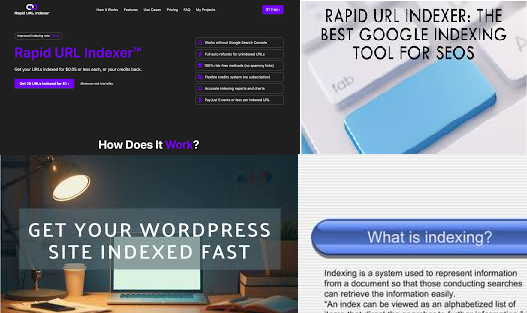In the world of SEO, indexing is the essential process that enables search engines like Google to find and list your website’s pages in search results. Without indexing, your content won’t be visible to people searching for topics related to your site. Google’s indexing system scours the web for new and updated pages and records them so they can be displayed when relevant queries are made. In this article, we’ll dive into the details of indexing, what it means for your website, and how to use the Rapid URL Indexer plugin to help your pages get indexed quickly.
Understanding Indexing and Its Importance in SEO
Indexing is a fundamental part of how search engines operate. When a page is indexed, Google’s algorithms analyze its content, determine its relevance, and catalog it for easy retrieval. Indexed pages are those that can appear in Google search results, while unindexed pages remain invisible in searches.
Indexing is crucial because:
- It Boosts Search Visibility: Indexed pages are eligible to show up in search results, increasing the chances of your website reaching potential audiences.
- Improves SEO Ranking Potential: Once indexed, Google can rank your pages based on their relevance and quality.
- Allows for Frequent Updates: Indexed pages can be re-crawled by Google whenever you update your content, keeping your SEO strategy current.
Why Use Rapid URL Indexer?
The Rapid URL Indexer is a WordPress plugin that speeds up the indexing process by helping submit URLs directly to Google. It’s an ideal tool for website owners who want faster indexing results, particularly if you have a large site or frequently update content.
How to Index Your Website on Google with Rapid URL Indexer
To use Rapid URL Indexer effectively, follow these steps:
1. Install the Rapid URL Indexer Plugin
- Go to your WordPress dashboard.
- Navigate to Plugins > Add New.
- Search for “Rapid URL Indexer.”
- Click Install Now, then activate the plugin once the installation is complete.
Installing this plugin adds a valuable tool to your WordPress site, allowing you to manage indexing without having to access Google Search Console directly.
2. Submit URLs for Indexing
- Once activated, go to the Rapid URL Indexer settings.
- Enter the URLs you want Google to index, ideally new or updated pages on your website.
- Click Submit URLs to send your URLs directly to Google for indexing.
This is particularly useful for newly published pages or those you’ve recently made changes to, as it signals to Google to prioritize these URLs.
3. Wait for Initial Results (4 Days)
- Google will begin to crawl the submitted URLs, typically within a few days.
- You can expect a preliminary report from the Rapid URL Indexer within around 4 days, indicating which pages Google has started to index.
- Keep an eye on this initial report, as it provides a good idea of Google’s responsiveness to your submitted URLs.
4. Check Final Indexing Report (14 Days)
- After about 14 days, the Rapid URL Indexer will provide a comprehensive report showing which of your URLs have been successfully indexed.
- This final report is valuable, as it confirms the visibility of your pages in Google search results and can reveal any issues with unindexed pages.
Additional Tips for Ensuring Your Pages Get Indexed Quickly
While the Rapid URL Indexer plugin streamlines the process, there are additional best practices you can follow to improve indexing rates:
- Create a Sitemap: A sitemap is a file that lists all the pages on your website, making it easier for search engines to crawl and index your content. Most SEO plugins like Yoast SEO can help you generate a sitemap automatically.
- Optimize Internal Linking: Internal links connect your pages to one another, improving crawlability. When Google crawls one of your pages, it can easily discover and index linked pages.
- Update Content Regularly: Fresh content signals Google to re-crawl your site, which can prompt faster indexing for new or updated pages.
- Use Google Search Console: Submitting your site’s sitemap and monitoring crawl errors in Google Search Console ensures you’re aware of any indexing issues that need attention.
- Avoid Duplicate Content: Duplicate content can confuse Google and prevent pages from being indexed. Make sure each page on your website has unique, valuable information.
Final Thoughts
Indexing is an integral part of SEO, as it ensures your website’s pages are visible to search engines and accessible to users. The Rapid URL Indexer plugin provides a straightforward, efficient way to submit your URLs for indexing, helping your content get noticed faster. By following the steps above, you’ll be able to index your website on Google more effectively, helping increase your visibility and ultimately boosting your SEO efforts.



